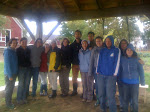Today some friends and I cleaned the poop out of a smaller chicken coop. It is a coop that holds our "meat birds" --birds raised only for the meat, not for laying eggs. The particular breed we have has been designed to grow quickly and be ready for slaughter by 8 or 9 weeks old. For as economical as this may sound, it is an unpleasant thing to watch. They grew so quickly that the feather building process couldn't/wouldn't keep up. Now they are seven weeks or so, their legs are thick but not strong enough to hold up their bulky, meaty body. Here is a little video clip of the poor things:
Their coop is heated by lamps so they don't have to expend energy keeping warm. They have food and water at beak-level. They rarely go outside because their bodies are so ungainly and it isn't safe walking down the foot-long gang-plank to the outside. Here is a video of two adventurous ones sitting outside. Those specks on the ground are chicken scratch--delicious morsels of grain that chickens love:
Because it isn't mobile, this breed of chicken must lay it it's own excrement day by day. There are all sorts of choices a farmer must make for the good of her farm and for managing a budget. This option may not be a good fit for me. We student farmers are growing these birds for our own consumption and we will have the opportunity to choose a different breed to raise next spring.
Field work:
 |
| The roots have grown! |
We began our field work by harvesting parsnips and leeks. We took a little break in the middle of the morning to examine the garlic we had planted two weeks ago.
 |
| Loading the straw on the trailer |
 |
| Nate demonstrating straw mulch |
 |
| Mulching to the end of the bed |
 |
| Remay, unfurling |
 |
| Rosalind from Haiti |
In the afternoon, we loaded straw on the wagon and then spread the bales on the strawberry beds. We also streteched a piece of "remay" across the garlic beds--like unfurling a sail, says Nora. Both straw and remay will keep the tender roots of our overwintered plants from freezing. Our day was highlighted with the visit of Rosalind, a garden educator from Haiti. We all tried out our French on her and began learning about her work with children ages 9 to 20.







No comments:
Post a Comment